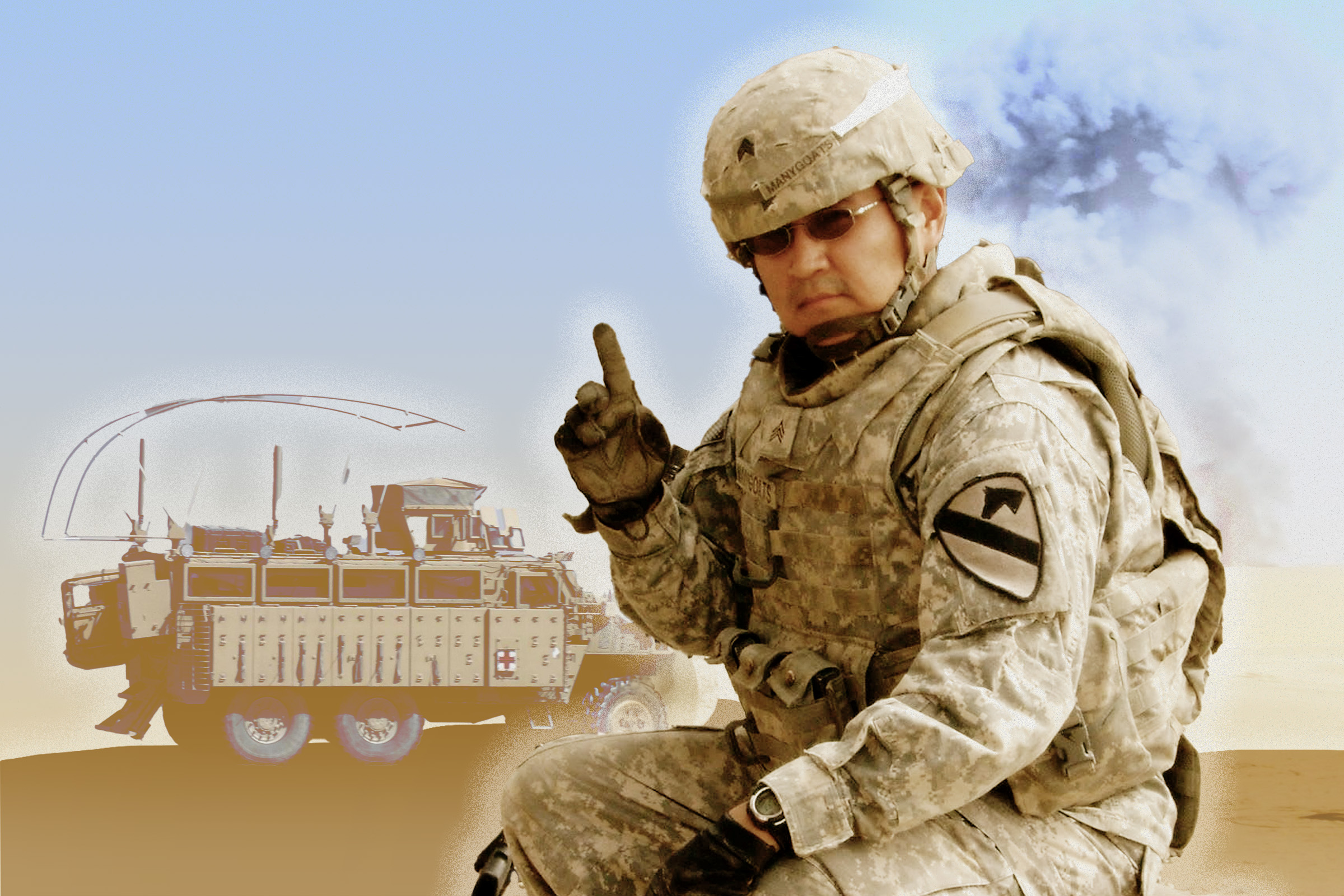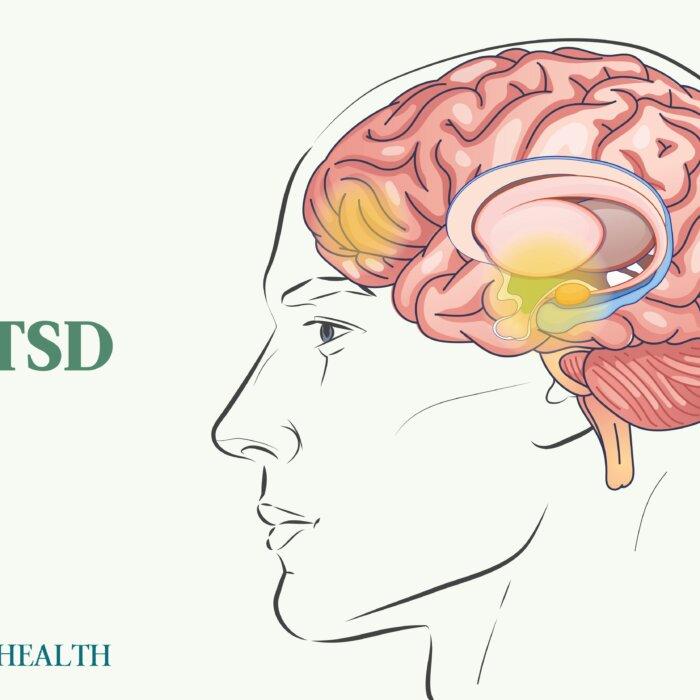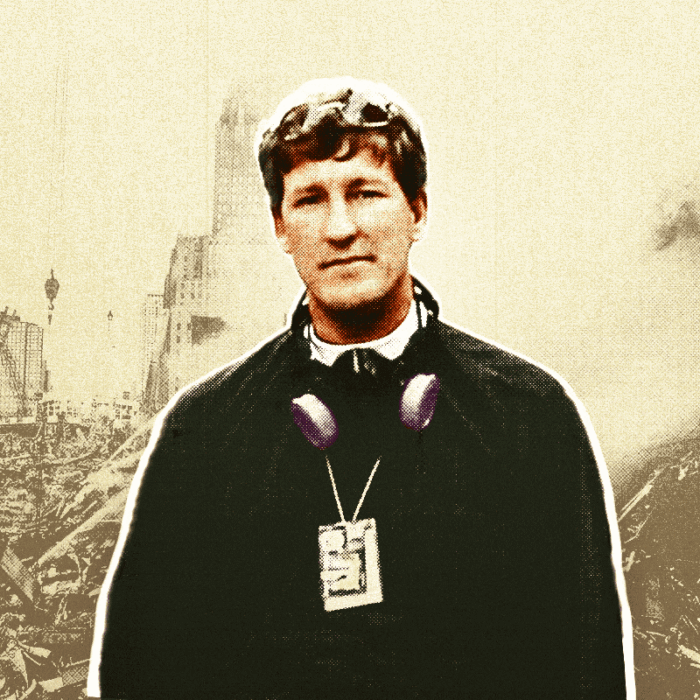In the scorching heat of Taji, Iraq, where bullets zinged past close enough that he could feel their heat and explosions shook the ground beneath his boots, Larrison Manygoats carried an unlikely tool into combat.
Tucked away in his back pocket, wrapped carefully in a sandwich bag, was a small blue book that, for Manygoats, proved more powerful than any weapon.
Forged in the Canyons
Every morning, before the sun peeked over the horizon of the red earth canyons in Arizona, young Manygoats would be jarred awake by his Navajo elders.“Go run till the sun comes up,” they would tell him.
According to Manygoats, “Being a warrior was part of our culture.”
His great-great-grandfather, Jeff King, had been a Cavalry Scout, bridging the gap between the Native American tribes and the U.S. military during the era of Manifest Destiny. That same spirit would flow through generations. His grandfather served in World War II, his father in Vietnam, and Manygoats, as the oldest sibling, followed suit and became a Marine. Marching behind him, his two younger brothers would eventually join the Marine Corps, while his sister, affectionately known as “the oddball,” was set to join the U.S. Army.
With the warrior legacy coursing through his veins, Manygoats’s path seemed inevitable. He was 18 when he joined the Marines. Of 145 recruits in his boot camp, only 45 graduated—he was among them.

Amid his military training, a change was taking place—not within Manygoats, at first, but with his father at home.
Three years into his Marine Corps career, Manygoats watched his once hardcore father become more gentle and compassionate. He even started to speak more thoughtfully than before. His father had begun practicing Falun Dafa, a spiritual meditation discipline centered on the principles of truthfulness, compassion, and tolerance. The shift was striking, and it sparked Manygoats’s curiosity.
Soon enough, his father passed on the small blue book—“Zhuan Falun,” the principal text of Falun Dafa—to Manygoats. Although Manygoats didn’t fully understand what the book was about, he knew one thing: The book was good and he had to carry it with him.
Faith Under Fire
Stationed near Taji with just five or six soldiers, Manygoats served as a quick reaction force. As the point man, he intentionally drew enemy fire to protect his unit. He was fighting during the height of the Iraqi insurgency—it wasn’t just a regular battle.“We were dealing with the terrorists of the world,” he said.
Through hundreds of missions, explosions, and whistling bullets, he didn’t have to take any lives, and more than that, he emerged without a single serious injury—a fact that he attributes to a force beyond luck.


In quiet periods between missions, hidden inside operating bases, Manygoats would pull out the blue book.
Opening the Door to Nothing and Nobody
Like too many veterans, when Manygoats returned from Iraq in 2008 after two years of deployment, his hardest battle was just beginning.“I had nothing left,” he recalled. “Wife gone, divorced, behind on bills, nobody taking care of me. No welcome home, no freaking parades—nothing. I came home to a completely empty house, and my mind wasn’t straight.”
The gap between military training and civilian readjustment proves hard for many veterans, and Manygoats was no exception.
“Everything that you ever feared is amplified [in war],” he said. According to him, those fears haunt you when you come back home.
Years on the front lines amid innumerable explosions and concussive blasts, followed by the emptiness of returning home, led to Manygoats being medically diagnosed and discharged with PTSD and traumatic brain injury. He suffered memory loss, physical tremors, and emotional volatility.
“My body and hands would start to shake,“ he said. ”My mind was talking, but my mouth wasn’t.”
Alone, with nothing left and a wounded brain, he felt the familiar weight of the blue book still in his pocket.


Without the constant pressure of war, he began to calmly study the teachings and diligently practice Falun Dafa’s five exercises, which incorporate meditation, gentle movements, and spiritual cultivation. He felt a fundamental healing from within.
In less than one year, people began to tell him, “Wow, you look healthy.”
“When they found out I‘d been to war, they’d say, ‘You don’t look like a fighter,‘” he said. “’You don’t look like a warrior.’ They couldn’t believe how I recovered in such a short amount of time. That’s what Falun Dafa did for me.”
Measurable Results
The Department of Veterans Affairs reports that approximately 17 veterans die by suicide every day. For Native American veterans such as Manygoats, the statistics are even more dire, with suicide rates exceeding national averages, sometimes by twice as much.Dr. Donna Ames, a now-retired Veterans Affairs psychiatrist who once had more than 500 patients at one time, witnessed this tragedy repeatedly.
“Without purpose and meaning, people become hopeless,” she told The Epoch Times. Ames would speak to veterans and ask, “What’s your dream? What would you like to do?” She realized that they couldn’t see a future.
In her clinical practice, she helped veterans rediscover hope by moving beyond the traditional “here’s your pill” approach to embrace a holistic framework with meaning and purpose at its core.
Ames introduced movement-based practices such as tai chi, qigong, and dance to veterans.
“It was very well accepted, and patients really liked it,” she said. The practices helped patients connect with their bodies, regulate breathing, and achieve mindfulness, reducing anxiety and improving mood.
Above all, she saw beyond the anatomy and directly addressed their spiritual health.
“You’d see people with severe negative affect, who would never smile, start smiling,” she said. Some patients would say, “Why didn’t I meet you 10 years ago?”
“These studies show one after the other ... that the religious person is just doing better, and it’s way beyond just correlation,” he told The Epoch Times.

“Religious beliefs provide a framework to live life in a way that leads to flourishing in all domains,” Koenig said. “They help people adapt, bounce back from severe trauma, and make sense of traumatic events by giving them meaning and purpose, even allowing potential for growth.”
Serving Others
Further spirituality goes beyond oneself and flows outward by helping others.Koenig supports a service-oriented approach to healing.
“You can’t get the flourishing if you go directly for it, but if you go for this goodness—serving others, practicing virtues—it leads to flourishing automatically,” he said.
This principle drove Manygoats’s next chapter. By summer 2013, he realized that he could help others on their path of recovery. He created a veterans support organization centered on wild horse therapy on the Navajo reservation near Tuba City, Arizona.
Closing the Circle
For Manygoats, his spiritual foundation provided what conventional treatments often miss: a sense of divine connection that filled the emptiness.“Think of yourself as a circle with a hole,“ Ames said. ”When you have God in your life, your circle is closed. Without God, your circle is open, and you’re going to try to fill it with drinking, drugs, sex, money—but it will never satisfy.”
Her practical recommendations form a daily foundation: prayer or meditation, time in nature, and the cultivation of gratitude.
Today, Manygoats still carries his father’s blue book. The pages are soft and ragged now, and the sandwich bag has been replaced many times over, but the book’s power, Manygoats said, remains unchanged.












